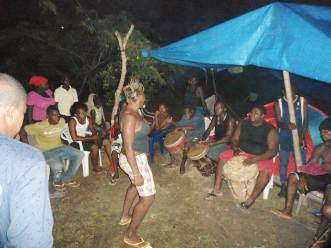Triunfo de la Cruz, on the Caribbean coast of Honduras, seems idyllic – a white sand, palm-lined beach, and children playing in the surf. However, it is one of many sites in a long-running battle for the land and culture of the Garífuna people, descendants of Afro-indigenous people from St Vincent who were exiled to the Honduran coast by the British in the 18th century.
Problems began in 1993 when the city of Tela expanded municipal boundaries to include Triunfo, and began illegally selling off fully-titled Garífuna land for tourist projects. In response, the community founded CODETT (Triunfo Land Defense Committee), which established Faluma Bimetu (“Sweet Coconut”), the Garífuna’s first community radio station. That same year, Alfredo López, the radio’s director, was wrongfully imprisoned for drug-trafficking. His case went to the Inter- American Commission on Human Rights (IAHRC) and he was eventually acquitted after 7 years in jail.
Alfredo’s case is just one in a series of relentless acts of persecution against CODETT for opposing tourism megaprojects. In 2006, the IAHRC granted the entire community protective measures. However, persecution continues – the radio was burned down in 2010 and Alfredo’s house in 2011. The Honduras Accompaniment Project has accompanied CODETT since 2011, in Triunfo and in actions with OFRANEH (Fraternal Black Organization of Honduras), which represents Garífuna interests nationally.
Currently OFRANEH is struggling to reclaim and protect collective lands in Vallecito, 150 miles east of Trujillo, where six Garífuna cooperatives gained legal title to their land in 1997. This coastal strip has since become a corridor for drug-trafficking and organized crime which, along with the theft of over half their land by the notorious landowner Miguel Facussé and alleged drug-trafficker Reinaldo Villalobos, has forced many Garífunas to abandon the area. At the end of August, after much pressure from OFRANEH, the INA (National Agrarian Institute) began to demarcate Vallecito, as the first step in a process to reclaim the cooperatives’ lands which are crucial for food security and where they intendto build the first Garífuna University.
In August, OFRANEH called on over 40 communities to establish an encampment in this treacherous territory in order to assert their land rights. Heavily armed patrols sent by strong men Facusse and Villalobos harass the camp: surrounding, entering into it and firing machine gun rounds into the air, attempting to intimidate the Garífunas into leaving. The Garífunas’ answer to gunfire is the steady beat of their drums. The drums, a deep part of  Garifuna culture, are the people’s non-violent response to the threat of violence and play a key role in keeping spirits and morale strong in the camp.
Garifuna culture, are the people’s non-violent response to the threat of violence and play a key role in keeping spirits and morale strong in the camp.
 Garifuna culture, are the people’s non-violent response to the threat of violence and play a key role in keeping spirits and morale strong in the camp.
Garifuna culture, are the people’s non-violent response to the threat of violence and play a key role in keeping spirits and morale strong in the camp. Land recovery in Vallecito has taken on heightened urgency because it is located in the middle of a proposed ‘model city’ – privatized, tax free, economic enclaves with their own laws, police and foreign government. This model city alone would impact over one half of Honduras’ Garífuna communities.
The ‘model city’ project is strongly contested by Honduran civil society; over 76 legal challenges to the project have been lodged in the Supreme Court, including one by OFRANEH. Human rights attorney Antonio Trejo Cabrera, who was gunned down in Tegucigalpa on September 22 was part of a group of lawyers who had also presented a challenge to the project.
While these challenges have stalled the formal establishment of the Orwellian-sounding Transparency Commission to oversee the Cities’ governance, on September 4th the Honduran government signed a Memorandum of Understanding for $14 million with the U.S. based MKG Consortium to establish the first model city. This triggered the resignation of Paul Romer, NYU economist and model cities guru from his post as head of the Transparency Commission in protest for being shut out of negotiations with MKG. Legal challenges and in-fighting between power groups may continue to stall the advance of the “model cities” however it is clear that the Garifuna people, lands and natural resources are at risk.
For now, the camp in Vallecito continues, and along with it, the Garífunas’ drums and peaceful campaign for their lands.
By Jill Powis
Honduras Accompaniment Project
(PROAH – Proyecto de Acompañamiento Internacional en Honduras)
For more information:
OFRANEH www.ofraneh.org
http://www.friendshipamericas.org/honduras
